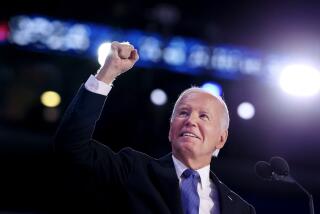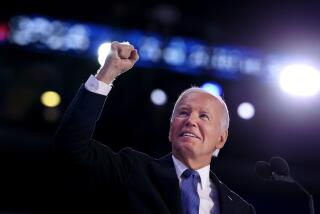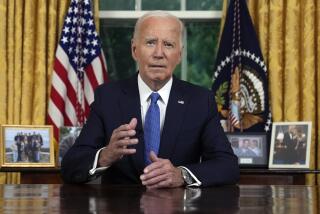Clinton Toils for a Speech That Inspires
WASHINGTON — As tens of thousands of his countrymen prepared for his inauguration with an array of pageants and parties, President Clinton spent much of the weekend holed up with his most trusted advisors and speech writers, massaging the message he will present to the American people today.
Aides said Clinton practiced his speech with a tape recorder, editing and polishing as he went along. His speech writers then took the tapes, incorporated his changes into the text and sent the revisions back for approval. The elaborate cycle was repeated numerous times as the inauguration address neared.
The weekend cram session is the conclusion of a process that began soon after Clinton won reelection, according to White House Press Secretary Mike McCurry. And the president is not likely to complete his revisions until shortly before he gives his address at noon EST.
Although Clinton skipped inauguration festivities Saturday to focus on his speech, he did spend some time Sunday outside the White House. He took in two morning church services and attended the Presidential Gala with his wife, Hillary Rodham Clinton, and his daughter, Chelsea.
McCurry said Clinton, in crafting his second and final inauguration speech, was focusing on how to communicate concisely his view of where America stands at this point in history and, in the most compelling way possible, call upon the nation to come together to meet the challenges of the future.
When asked what he most wants Americans to feel after hearing the speech, Clinton said: “I’d want them to be excited about our future and eager to build it,” according to McCurry.
To differentiate the address from campaign speeches or State of the Union addresses, Clinton spent countless hours during the last three months reading poetry and collections of great oratory in an attempt to imbue the text with lyricism and depth.
“What he’s trying to do is be a little more contemplative and perhaps a little more poetic,” McCurry said.
Particularly inspiring to Clinton as he crafted the speech, McCurry said, was a Bible verse from the Book of Nehemiah: “And they said, ‘Let us rise up and build,’ so they strengthened their hands for this good work.”
But the press secretary added that it was not clear that the verse would make the final cut.
Because the inauguration takes place on the holiday honoring the Rev. Martin Luther King Jr., Clinton read the civil rights leader’s essay, “A Testament of Hope.” He also studied past second-term inaugural addresses and asked some of his close advisors, such as departing Housing and Urban Development Secretary Henry G. Cisneros, to send him proposed language for the speech.
But his aides stress that the final product, although reflecting the input of dozens of others, is predominantly Clinton’s.
*
The process began late last year as Clinton made notes to himself of the main points he wanted to make in his speech. Then, using these ideas, the president, who almost always composes his speeches verbally instead of writing them down, dictated the first draft of various passages straight into his tape recorder. The speech writers then took the recordings and stitched them together.
At every stage, the president reviewed and revised the emerging text.
“He’s very much a people person: The best way for him to pull words out of his mind is for him to talk something out with people around,” said David Kusnet, who started writing speeches for Clinton during the 1992 campaign and was head White House speech writer until early 1995. “If he just spoke into a tape recorder without people around, it would not have the life it has when he’s talking with a group of people.”
Kusnet said he always joked that the president’s speech writers are the “highest-paid stenographers in America,” because their job is mainly to transcribe and polish.
“He’s capable of composing not only entire sentences or paragraphs but entire texts in his own mind as if he had a word processor in his mind,” Kusnet said.
More to Read
Get the L.A. Times Politics newsletter
Deeply reported insights into legislation, politics and policy from Sacramento, Washington and beyond. In your inbox three times per week.
You may occasionally receive promotional content from the Los Angeles Times.










